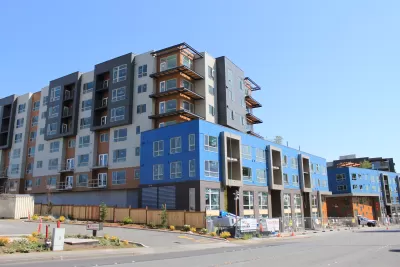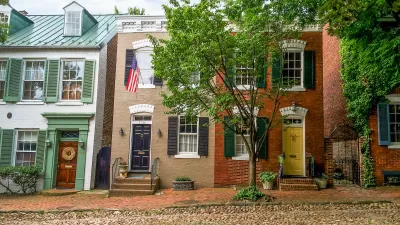Housing underproduction in the United States is growing more severe and more widespread.

The Up for Growth Housing Underproduction™ report for 2022 details the state of housing production in the United States, as well as “practical and tangible solutions” for advocates and policymakers.
According to the report, the nation is short 3.79 million housing units as of 2019, up from 1.65 million in 2012. The shortage is also growing more widespread: while 100 metropolitan areas experienced underproduction in 2012, that number was up to 169 metro areas in 2019. “The extent of underproduction varies from state to state: California has the largest deficit of homes at 980,000, while Mississippi is only short 1,000. Only Vermont saw an improvement.”
The factors impacting housing production are varied: “For example, in Detroit, underproduction is driven by uninhabitable units, while in Sacramento, a lack of housing is driving the shortage. In Washington DC, underproduction is fueled by a lack of household formation,” the report notes.
Even before the pandemic, areas that had not previously experienced housing shortages began to see a deficit. As an article by Emily Badger and Eve Washington in the New York Times puts it, “What once seemed a blue-state coastal problem has increasingly become a national one, with consequences for the quality of life of American families, the health of the national economy and the politics of housing construction.”
To help boost housing production, Up for Growth has developed “a policy framework that seeks to create more homes in areas with high economic mobility, access to jobs, and existing infrastructure” they call A Better Foundation. A Better Foundation “optimizes the distribution of these underproduced homes by prioritizing development in high-opportunity neighborhoods—places that are rich in jobs, transportation, infrastructure, and community assets—at a density scaled to fit into the existing neighborhood while increasing housing options.”
One major step is changing outdated zoning laws that don’t allow for flexibility in density and uses, mandate large lot sizes and parking, and prevent the construction of “missing middle” housing. The full report details the housing types recommended for different types of neighborhoods based on their existing density and strategies for improving equity and affordability.
FULL STORY: Housing Underproduction™ in the U.S. 2022

Manufactured Crisis: Losing the Nation’s Largest Source of Unsubsidized Affordable Housing
Manufactured housing communities have long been an affordable housing option for millions of people living in the U.S., but that affordability is disappearing rapidly. How did we get here?

Americans May Be Stuck — But Why?
Americans are moving a lot less than they once did, and that is a problem. While Yoni Applebaum, in his highly-publicized article Stuck, gets the reasons badly wrong, it's still important to ask: why are we moving so much less than before?

Research Shows More Roads = More Driving
A national study shows, once again, that increasing road supply induces additional vehicle travel, particularly over the long run.

Minneapolis Bans Rent-Setting Software
Four cities have enacted restrictions on algorithmic software that can inflate rent costs.

Oakland to Add 244 New EV Chargers
Oakland plans to launch its new charging network at eight locations by the end of 2025.

Jane Goodall Inspires with Message of Hope, Resilience, and Environmental Action
Speaking in Pasadena, Jane Goodall offered a hopeful and inspirational message, urging global compassion, environmental responsibility, and the power of individual action to shape a better future.
Urban Design for Planners 1: Software Tools
This six-course series explores essential urban design concepts using open source software and equips planners with the tools they need to participate fully in the urban design process.
Planning for Universal Design
Learn the tools for implementing Universal Design in planning regulations.
Heyer Gruel & Associates PA
City of Moreno Valley
Institute for Housing and Urban Development Studies (IHS)
City of Grandview
Harvard GSD Executive Education
NYU Wagner Graduate School of Public Service
City of Cambridge, Maryland
Newport County Development Council: Connect Greater Newport





























